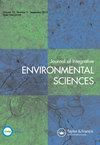Adaptive decision-making under conditions of uncertainty: the case of farming in the Volta delta, Ghana
IF 3.5
4区 环境科学与生态学
Q3 ENVIRONMENTAL SCIENCES
Journal of Integrative Environmental Sciences
Pub Date : 2020-01-01
DOI:10.1080/1943815x.2020.1729207
引用次数: 13
Abstract
ABSTRACT Farming in Ghana’s Volta delta is increasingly affected by variability in rainfall conditions and changes in land-use patterns. Under such socio-ecological conditions, little is known about farmers’ decision-making in response to uncertainties in uncertain rainfall conditions. To fill this gap and add to the literature on adaptive decision-making, we addressed the central question: what are the existing patterns of farming decision-making under uncertain rainfall conditions, and which decision-making strategies are adaptive? We developed an adaptive decision-making framework to investigate the behavior of farmers under variable rainfall conditions in Ghana’s Volta delta in the Ada East District. We conducted 5 interviews with agricultural extension agents, 44 in-depth interviews and 4 focus group discussion with farmers. Subsequently, we interviewed a sub-selection of 32 farmers. Findings of the study shows that farmers carry out different decision-making patterns in response to the variable rainfall conditions. We distinguished six strategies: three based on flexibility and three based on robustness. Flexible adaptive decision-making strategies are switching dates for sowing seeds through wait-and-see or delay strategy, muddling through the farming season with the application of various options and alternative irrigation strategies. Robust adaptive decision-making strategies are portfolio strategy of transplanting seedlings in batches, selection of robust (hardy) crops, and intercropping or diversification. Based on how farmers select strategies in response to uncertainty in rainfall conditions, we argue that some decision-making strategies are more adaptive than others. Findings of this study are relevant for the design and implementation of climate related agricultural projects.不确定条件下的适应性决策:以加纳沃尔特三角洲的农业为例
加纳沃尔塔三角洲的农业日益受到降雨条件变化和土地利用模式变化的影响。在这样的社会生态条件下,农民对不确定降雨条件下的不确定性做出的决策知之甚少。为了填补这一空白并增加适应性决策的文献,我们解决了核心问题:在不确定降雨条件下,现有的农业决策模式是什么,哪些决策策略是适应性的?我们开发了一个适应性决策框架,以调查加纳阿达东区沃尔特三角洲多变降雨条件下农民的行为。我们对农业推广人员进行了5次访谈,44次深度访谈和4次农民焦点小组讨论。随后,我们采访了32位农民。研究结果表明,农民在不同的降雨条件下采取了不同的决策模式。我们区分了六种策略:三种基于灵活性,三种基于鲁棒性。灵活的适应性决策策略是通过观望或延迟策略来改变播种日期,通过应用各种选择和替代灌溉策略来混过农业季节。鲁棒适应性决策策略包括分批移栽、选择健壮(耐寒)作物和间作或多样化的组合策略。基于农民如何选择应对降雨条件不确定性的策略,我们认为一些决策策略比其他决策策略更具适应性。本研究结果对气候相关农业项目的设计和实施具有重要意义。
本文章由计算机程序翻译,如有差异,请以英文原文为准。
求助全文
约1分钟内获得全文
求助全文
来源期刊

Journal of Integrative Environmental Sciences
ENVIRONMENTAL SCIENCES-
CiteScore
3.90
自引率
0.00%
发文量
13
审稿时长
>12 weeks
期刊介绍:
Journal of Integrative Environmental Sciences (JIES) provides a stimulating, informative and critical forum for intellectual debate on significant environmental issues. It brings together perspectives from a wide range of disciplines and methodologies in both the social and natural sciences in an effort to develop integrative knowledge about the processes responsible for environmental change. The Journal is especially concerned with the relationships between science, society and policy and one of its key aims is to advance understanding of the theory and practice of sustainable development.
 求助内容:
求助内容: 应助结果提醒方式:
应助结果提醒方式:


